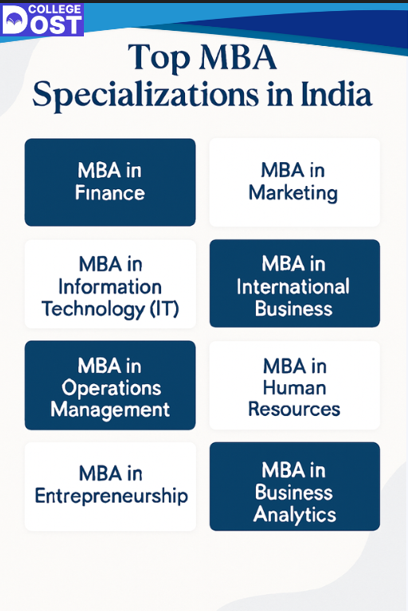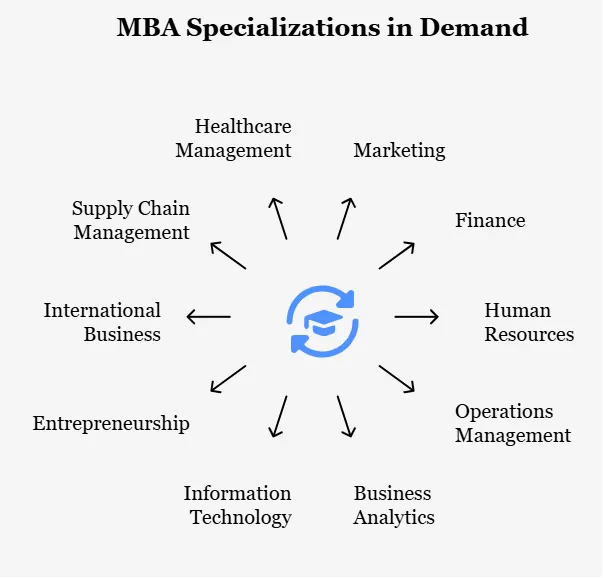Summarise With AI

Table of Contents
Aspirants who are preparing for a Management career are often confused about what the right MBA specializations are to choose from. With the dynamic nature of the Indian job market, B-schools now offer a wide range of specializations catering to diverse industries and roles. From traditional domains like Finance and Marketing to emerging fields like Business Analytics and Sustainability, each specialization offers unique opportunities and career paths. Artificial Intelligence, Digital Marketing and Sustainability will likely lead the MBA space by 2025. Students must pick the right MBA specialisation that promises both rewarding career prospects and lets them make a difference in their chosen industry.
In this blog, we explore the top 10 MBA specializations in India, helping you make an informed decision based on your interests, strengths, and long-term goals.
MBA Specializations: Highlights
MBA specializations are a focused study area within a Master of Business Administration programme that helps students become experts in specific business domains. Traditional MBA programmes take a broad approach, while specializations provide concentrated knowledge in particular industries or functions.
| Category | Popular MBA Specializations in India | Notes |
| Traditional Specializations | Finance, Marketing, International Management, Human Resources, IT/Systems, Operations Management, Entrepreneurship | These are the most sought-after and considered safest career options by most students. |
| Emerging Specializations | Business Analytics, Data Science, IT Management, Global MBA | Growing due to changing business needs and technological advancements. |
| Niche Specializations | Health Care Management, Communications Management, Innovation, Hospitality and Tourism, Sports, Fashion, AgriBusiness | Increasing in popularity as specialized fields gain importance in the market. |
How to Choose the Right MBA Specializations?
Selecting the right MBA specialization is crucial as it impacts your career path and opportunities. It requires a careful evaluation of your interests, industry trends, ROI, and the reputation of the institute. Here are key considerations to help you make an informed choice:
- Assess Interests and Strengths: Pick a specialization that matches your talents and experience, using tools like MBTI for guidance.
- Understand Industry Demand: Choose fields with rising demand like Business Analytics, Fintech, and Digital Marketing based on market trends and placements.
- Evaluate ROI and Placements: Prioritise specializations with high ROI, good salaries, scholarships, and proximity to industry hubs.
- Consider Institute Reputation: Opt for reputed schools with strong faculty, industry links, and top accreditations for better career support.
- Focus on Employability: Select institutes with strong placements, alumni networks, and internship opportunities for long-term growth.
Top MBA Specializations in India
Given below is the list of the top MBA Specializations in India. You can also further read about each specialization in detail.

Top 10 MBA Specializations List in India
There is a wide range of MBA specializations in India to meet the evolving demands of various industries. Whether you’re inclined towards finance, marketing, operations, or emerging fields like data analytics and digital transformation, choosing the right specialization is key to aligning your MBA with your career goals. Given below are the top 10 MBA specializations in India that are highly sought after by students and recruiters alike.
MBA in Finance
Finance remains one of the most popular MBA specializations in India. Students who graduate can choose from many career paths in banking, investment, and corporate sectors. This specialisation gives you deep knowledge of financial management principles, tools, and techniques that help navigate the complex digital world.
| Semester | Key Subjects |
| First Year (Sem I & II) | Management Concepts & Organisational Behaviour, Accounting for Managers, Financial Management, Marketing Management, Research Methodology, Operations Research and Management |
| Second Year (Sem III & IV) | Strategic Financial Management, Banking and Indian Financial System, Investment and Portfolio Management, Security Market Operations, Financial Derivatives, Project Work |
| Electives | Mergers and Acquisitions, Behavioural Finance, Credit Analysis, Wealth Management |
Also Check: Top 10 MBA In Finance Colleges In India
Top colleges offering MBA Finance Specialization
Your career prospects and earning potential improve a lot when you graduate from a premier institution. Here are some of India’s best colleges for this specialization:
| Institution | Approx Average Package (INR) | Top Recruiters |
| IIM Calcutta | INR 35.07 LPA | BCG, Axis Bank, ICICI Bank, Amazon |
| IIM Ahmedabad | INR 34.36 LPA | Goldman Sachs, HSBC, McKinsey, JP Morgan |
| IIM Bangalore | INR 35.31 LPA | Bajaj Finserv, Citibank, JP Morgan, Adani Group |
| JBIMS Mumbai | INR 28.02 LPA | Reliance, Hindustan Unilever, Goldman Sachs |
| FMS Delhi | INR 25.6 LPA | Microsoft, JP Morgan, Nestle, SBI |
Career roles and average salaries
MBA Finance graduates can find rewarding roles across the financial sector:
| Role | Approx Average Salary (Per Annum) | Industries Hiring |
| Financial Analyst | INR 5-6 LPA | Banking, Consulting |
| Investment Banker | INR 10-12 LPA (freshers) | Investment Firms |
| Chief Financial Officer | INR 12-25 LPA | Corporates |
| Portfolio Manager | INR 10-39 LPA | Asset Management |
| Risk Manager | INR 8-20 LPA | Banks, Insurance |
MBA in Marketing
MBA Marketing stands out as a versatile specialisation that combines creativity with analytical thinking. Students learn how to understand consumer behaviour, create successful marketing strategies, and analyse market trends. The programme attracts many aspiring professionals because it opens doors to various career paths in both traditional and digital domains.
Top recruiters and job roles
Major companies like Procter & Gamble, PepsiCo, Unilever, Google, and AMEX hire MBA Marketing graduates. Indian recruiters include ITC, Marico, Flipkart, Britannia, and Asian Paints. These companies value marketing graduates’ mix of creativity, strategy, and leadership skills.
| Role | Average Annual Salary | Top Recruiters |
| Brand Manager | INR 7,06,274 | Marico, Nykaa, Nestlé, Amazon, ITC, Flipkart, Tata group companies |
| Marketing Manager | INR 5,00,000 – INR 10,00,000 | Infosys, TCS, Wipro, HDFC Bank, Amazon, Deloitte, Nestlé, Mahindra & Mahindra |
| Digital Marketing Manager | (Not Provided) | Google, Amazon, Meta, TCS, Infosys, Zomato, Swiggy, Byju’s, Unacademy, Razorpay, Meesho, CRED, WATConsult |
| Market Research Analyst | INR 4,47,600 | Major FMCGs (ITC, Marico, Britannia, Dabur, Asian Paints), consultancies and large MNCs |
| Social Media Manager | INR 4,00,000 – INR 6,00,000 | Digital marketing agencies (WATConsult, Webchutney, Kinnect), online platforms and large corporates |
MBA in Information Technology (IT)
The MBA in Information Technology (IT) specialisation combines management skills with technical expertise. This powerful mix has become highly valuable in today’s digital world. Companies now give priority to technology integration, and professionals with advanced IT degrees are in high demand.
An MBA in IT gives graduates two essential skills – management knowledge and technical expertise. These skills help them guide technology-driven business initiatives. The programme covers core business principles and specialised IT courses like database management, information system management, network operations, and strategic technology implementation. Graduates become professionals who can communicate effectively in both boardrooms and server rooms.
The programme works best for professionals who:
- Know technology but want business skills
- Want to connect IT operations with other departments
- Want to guide digital transformation projects
- Plan to switch from technical to strategic management roles
Career paths and growth opportunities
This specialization offers better pay and gives you more ownership, problem-solving opportunities, and creative freedom compared to technical roles. MBA IT graduates find opportunities across multiple industries with excellent growth potential:
| Roles | Approx Average Annual Salary | Top Recruiters |
| IT Manager | INR 12-21 LPA | TCS, Wipro, Infosys, HCL, Tech Mahindra, Accenture, Capgemini, Cognizant, IBM, ABC Consultants, Randstad, Michael Page |
| Business Analyst | INR 5-7 LPA | Amazon, Microsoft, Flipkart, Paytm, Ola, Cisco, TCS, Genpact, Accenture, Wipro, Cognizant, Deloitte, Capgemini, IBM |
| Analytics Manager | INR 10-15 LPA (avg: INR 18-24L) | Fractal Analytics, Amazon, Deloitte, LinkedIn, MuSigma, Flipkart, IBM, Accenture, epiFi, Adnaut, Khan Academy |
| Project Manager (IT) | INR 7-10 LPA | TCS, Infosys, Wipro, HCL, Capgemini, IBM, Accenture, Randstad, TeamLease, Adecco, Michael Page, Allegis Group |
| IT Business Relationship Mgr | INR 8-12 LPA | Large IT firms and MNCs: TCS, Infosys, HCL, Capgemini, Accenture, IBM, Wipro |
MBA in International Business
MBA programmes now emphasise International Business specialisation as companies grow beyond borders. Students learn to handle global market dynamics through courses in cross-cultural management, international trade, and global strategy.
MBA programmes in International Business give students a complete understanding of global business environments. Students participate in international residencies, build networks, and work with peers from different countries. Case studies, simulations, and real-life global experiences help students understand business at a global scale.
This specialisation gets into business deals between different countries and cultures. Students learn to work with varying trade laws, business practices, languages, and social norms. They become skilled at working naturally in multicultural settings and help accelerate growth in fast-changing global economies.
Skills required for cross-border roles
Working in international business needs specific skills beyond traditional management. These skills help graduates lead multicultural teams and find better career opportunities in India and abroad.
| Essential Skills | Description |
| Cross-cultural communication | Understanding different communication styles, body language, and expectations across cultures |
| Cultural intelligence (CQ) | Knowing how to understand, respect, and adapt to different cultural contexts |
| Global networking | Building connections across borders through conferences, professional organisations, and platforms |
| Adaptive thinking | Responding quickly to unforeseen circumstances in dynamic global environments |
| Emotional intelligence | Recognising how cultural backgrounds shape emotional expression |
| Negotiation skills | Understanding cultural differences in decision-making and negotiation styles |
Also Check: Top 10 MBA Colleges In India
Top colleges and recruiters
Major Indian conglomerates like TATAs, Mahindra Group, and Aditya Birla Group hire from these programmes. Multinational corporations also look for managers to run their international operations. Graduates often work as International Marketing Managers, Global Supply Chain Managers, Business Development Managers, and Foreign Trade Analysts. Leading institutions offer excellent MBA programmes in International Business:
| Institute | Approx Average Placement | Top Recruiters |
| IIFT Delhi & Kolkata | INR 27-29.6 LPA | Amazon, Google, Infosys, Accenture, Goldman Sachs, Asian Paints, Aditya Birla Group, Airtel, Flipkart, Godrej |
| SIIB Pune | INR 13.12 LPA (Domestic) | Infosys, Schneider Electric, Adani Group, HDFC Bank, Tata Motors, Accenture, IBM, Nestlé, HCL, Axis Bank |
| MDI Gurgaon | INR 25.6-27.67 LPA | McKinsey & Company, BCG, Accenture Strategy, Deloitte, Amazon, HCL, Tata Steel, ICICI Bank, Flipkart, EY, KPMG |
| FORE School of Management | INR 14.50 LPA | Deloitte, EY, Infosys, ICICI Bank, HSBC, Wipro, Tata Capital, Tech Mahindra, Nestlé (recent public reports) |
MBA in Operations Management
Operations Management is an important and highly skilled MBA specialisation that helps optimise business processes from production to delivery. Students learn to handle various business aspects such as planning, manufacturing, and service provision. The focus remains on efficiency and cost-effectiveness.
An MBA in Operations Management includes critical areas that are the foundations of modern business operations. Students get a deep understanding of:
- Supply Chain Management
- Inventory Control
- Quality Management
- Logistics
- Project Management
The programme combines theoretical concepts with practical skills in process improvement, cost management, and data analysis that apply to many business contexts. Operations management touches almost all parts of a business, making it one of the most versatile MBA specializations in India.
Industries Hiring Operations Managers
Global giants like Amazon, Apple, Boeing, and Ford Motors lead the recruitment drive. Indian powerhouses such as Tata Motors, Mahindra & Mahindra, and Flipkart also actively hire. Operations managers have many career options in a variety of sectors.
| Industry | Roles |
| E-Commerce | Supply Chain Manager, Operations Analyst |
| Manufacturing | Production Manager, Quality Assurance Manager |
| Logistics | Logistics Manager, Distribution Manager |
| IT | IT Sourcing Strategist, Service Manager |
MBA in Human Resources (HR)
HR Management has evolved beyond basic administration into a key driver of organisational success. Companies now recognise how vital talent management is, making an MBA in Human Resources increasingly popular.
Today’s HR professionals work as
- Strategic partners actively influence corporate decisions rather than only managing staff.
- They lead organisational change by focusing on leadership development, culture, and enhancing employee experience.
- Modern HR teams align workforce strategies closely with overall company goals.
- They design and implement employee welfare policies to support staff well-being.
- HR helps create positive workplace environments that improve productivity.
- HR managers serve as a bridge between employees and management while fostering a strong company culture.
Key Subjects And Skills
HR professionals need strong communication, coaching abilities, analytical thinking, and problem-solving skills. Technology continues to change workplace practices, making expertise in Human Resource Information Systems (HRIS) and people analytics more valuable. The MBA in HR curriculum offers complete coursework structured across four semesters:
| Semester | Key Subjects |
| 1st Sem | HR Management, Organisational Behaviour, Management Concepts |
| 2nd Sem | Organisational Development, Management Training, Management Accounting |
| 3ed Sem | HR Development, Industrial Relations, Labour Welfare |
| 4th Sem | Total Quality Management, Strategic Management, Entrepreneurship |
Career growth and job stability
Skilled HR professionals remain in high demand across industries like IT, manufacturing, healthcare, and retail. This demand creates excellent long-term career opportunities. The HR sector provides remarkable stability during economic changes. Career paths progress from entry-level positions to executive leadership.
| Role | Approx Average Salary | Top Recruiters |
| HR Manager | INR 8.5 LPA | Randstad, Michael Page, ABC Consultants, TeamLease, Adecco, Manpower Group, CIEL HR, Aon Hewitt, Kelly Services |
| Compensation and Benefits Manager | INR 13.5 – 21.1 LPA | Biocon, Metso Outotec, Air Works India, Bajaj Finserv, Service Lee Technologies, Encore Capital Group, Snapdeal, Axis Max Life |
| Chief Human Resources Officer (CHRO) | INR 45-68.7 LPA | Google, Microsoft, Amazon, Deloitte, Vedanta Group, Cairn Oil and Gas, Tata Group, Reliance |
MBA in Entrepreneurship
The entrepreneurship specialization in MBA programmes creates a focused path for students who want to launch their own ventures. This specialization has become increasingly popular among ambitious professionals.
Students learn essential tools and frameworks to establish successful businesses through this entrepreneurship concentration. The programme prepares them for the challenges of building and scaling businesses in today’s market. Professionals who want to develop new ventures, either within existing organisations or as independent startups, will develop an entrepreneurial mindset and strong management capabilities.
Curriculum Focus and Outcomes
Students begin with foundational courses like The Entrepreneurial Manager in their first year. The second year offers specialized subjects such as The Founder Mindset and Launching Technology Ventures. Students apply their classroom knowledge through consulting projects, startup simulations, and internships.
| Core Areas | Learning Outcomes | Skill Development |
| Business foundations | Recognition of opportunities | Risk evaluation |
| New venture creation | Strategic resource allocation | Data analysis |
| Entrepreneurial finance | Business plan development | Leadership |
| Innovation management | Funding acquisition | Collaboration |
MBA in Business Analytics
Business Analytics ranks among the most popular MBA specializations in India as businesses move toward analytical strategies. Organisations now base their decisions on objective data rather than gut feelings through Business Analytics. Companies utilise customer feedback, market trends, and financial data to guide their choices. This approach helps businesses boost customer satisfaction, improve strategic planning, and spot growth opportunities.
Tools And Technologies Taught
Students master descriptive, predictive, and prescriptive analytics with these tools. This combination creates a powerful skill set that analyses past performance, forecasts trends, and recommends the best actions. Students learn several crucial technical tools during their MBA in Business Analytics:
| Tool/Technology | Application | Industry Relevance |
| Python & R | Statistical analysis and modelling | High demand across sectors |
| SQL | Database querying and management | Foundation for all data analysis |
| Tableau | Data visualisation | Presenting insights to stakeholders |
| Excel | Data analysis and reporting | Universal business application |
| Machine Learning | Predictive modelling | Growing demand in all industries |
High-demand roles and industries
Leading employers include consulting firms (McKinsey, BCG), technology companies (Microsoft, IBM), financial institutions (JPMorgan, Goldman Sachs), and e-commerce giants (Amazon, Walmart). The job market offers graduates various roles with competitive salaries.
| Role | Approx Average Annual Salary (INR) | Top Recruiters |
| Data Scientist | INR 7,00,000 – INR 20,00,000 | Amazon, Google, Microsoft, Meta, Flipkart, Deloitte, Accenture, IBM, Infosys, Cognizant, Wipro, EY |
| Business Analyst | INR 6,00,000 – INR 12,00,000 | Amazon, Microsoft, Flipkart, Paytm, Ola, Cisco, TCS, Genpact, Accenture, Wipro, Cognizant, Deloitte, IBM |
| Marketing Analyst | INR 5,00,000 – INR 6,00,000 | FMCG companies, digital marketing agencies, e-commerce firms (Myntra, Flipkart), consulting firms |
| Financial Analyst | INR 4,00,000 – INR 10,00,000 | Banks (ICICI, HDFC), financial services firms, consulting companies, Big 4 audit firms |
| Operations Analyst | INR 4,00,000 – INR 7,00,000 | Logistics firms, supply chain companies, e-commerce firms, and manufacturing companies |
Also Check: IIM MBA Fees 2025
Top MBA Specializations In Demand
With industries evolving rapidly, certain MBA specializations have become more sought-after than ever. Today’s employers are looking for management professionals skilled in areas like Business Analytics, Finance, Marketing, and IT Management. These top MBA Specializations in-demand courses not only offer strong placement opportunities but also align with emerging trends in technology and global business. Choosing the right one can give you a competitive edge in the job market.

Conclusion
Choosing the right MBA specialization is a crucial decision that shapes your career path and future opportunities. In India, students can choose from traditional fields like Finance, Marketing, and HR, or emerging areas such as Business Analytics, Digital Marketing, and IT Management, reflecting today’s tech-driven business environment.
Most MBA programs begin with core courses before diving into specialized subjects, helping students build solid business fundamentals and domain expertise. No matter the path, MBA graduates from reputed institutes enjoy strong placement outcomes and diverse roles across industries.
Frequently Asked Questions
1. What are the most popular MBA specializations in India?
The most sought-after MBA specializations in India include Finance, Marketing, Human Resources, Operations Management, and Business Analytics. These fields offer diverse career opportunities and are in high demand across various industries.
2. How does an MBA in Finance differ from other specializations?
An MBA in Finance focuses on financial management, investment strategies, and corporate finance. It equips students with in-depth knowledge of financial markets, risk management, and analytical skills specific to the finance sector, making it ideal for roles in banking, investment, and corporate finance.
3. What skills are essential for success in an MBA in Marketing?
Key skills for success in an MBA in Marketing include strategic thinking, consumer behaviour analysis, brand management, data analysis, and strong communication abilities. These competencies enable graduates to develop effective marketing strategies and campaigns across traditional and digital platforms.
4. How can an MBA in Business Analytics benefit my career?
An MBA in Business Analytics can significantly enhance your career by equipping you with skills in data-driven decision-making, predictive modeling, and advanced analytics tools. This specialization is highly valued across industries for roles in data science, business intelligence, and strategic planning.
5. What factors should I consider when choosing an MBA specializations?
When selecting MBA specializations, consider your personal interests and strengths, industry demand, potential salary and career growth, institute reputation, and placement records. It’s also essential to evaluate the curriculum and ensure it aligns with your career goals and the evolving needs of the business world.




